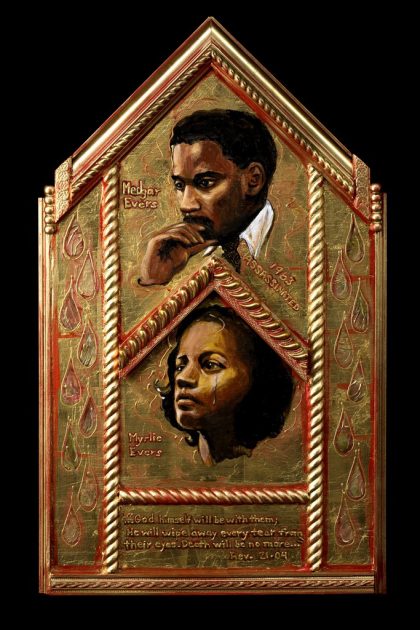Born in 1925, by the time he was 28 years of age, Medgar Evers had lost a friend to a lynch mob, had been turned away from a voting place by armed white men, and had been denied admission to a Mississippi law school because of his color. As a soldier he fought in World War II for the United States, “including Mississippi” he told people.He loved Mississippi, so he returned from the War with a commitment to steer his home state “toward civilization”.
Eventually he became the 1st NAACP field secretary for Mississippi. As such, he investigated the racial killings of George Lee, Lamar Smith and Emmett Till.He later arranged for the safe escape of Mose Wright after the elderly man testified against the white murderers of Emmett Till. He counseled James Meredith as he ran the gauntlet of white resistance to become the 1st black person to enroll in the University of Mississippi.
Evers owned his own home in Jackson, where he lived with his wife, Myrlie, and their children. In the spring of 1963, he was leading a drive for fair employment. Following a speech by the mayor which angered the black population, Evers was granted equal time by a local TV station to reply: “History has reached a turning point, here and over the world….Tonight the Negro knows that in the Congo a native can be a locomotive engineer, but in Jackson, he cannot even drive a garbage truck….”That speech and the central role he played in negotiations with city officials helped to make Medgar a hero to the black population.
On the night of June 12, 1963, President John Kennedy delivered to the nation his strongest speech on civil rights. “We face a moral crisis as a country and a people. A great change is at hand…it is our obligation to make that revolution peaceful and constructive for all.”Watching the speech at the NAACP office, Medgar was inspired by the speech.
When he pulled up to his house late that night and was getting out of the car, a loud shot rang out.Myrlie and the children had been waiting up for him; the children fell to the floor for safety when they heard the gunfire, but she ran to the door and, opening it, found her husband dying in the driveway.White Citizens Council member Byron DeLaBeckwith was tried twice and each time the trial ended in a hung jury.Just a few years ago, as new evidence surfaced, he was found guilty.
Medgar Evers was buried in Arlington National Cemetery. A military bugler played “taps” followed by 2000 mourners singing “We Shall Overcome”.Following his death, the first black police officer was hired in Jackson. Though not a complete victory, it was a major step toward the goals for which he had fought and died.

